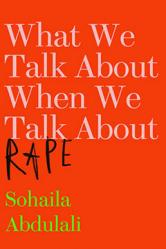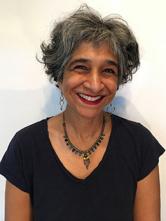AUTHOR SPOTLIGHT: Sohaila Abdulali
Thanks in large part to the #MeToo movement and to the increasing number of women who are courageously sharing their stories, the narrative around sexual assault and rape is changing. We sat down with Sohaila Abdulali to discuss her new book, What We Talk About When We Talk About Rape, at once a deeply personal and painfully all-too-common exploration of rape and rape culture. In stores now, What We Talk About When We Talk About Rape asks questions both simple and complex, addressing what we discuss, what we don’t, and what we—survivors, friends, families, activists—can and should do.
Sohaila Abdulali is the author of two novels, as well as children’s books and short stories. She has spent time as a professor, a speaker, an industrial spy, and an ice cream scooper. Learn more about Abdulali and her work here.
Talk a little bit about the early response that What We Talk About When We Talk About Rape has been receiving from readers.
SOHAILA ABDULALI: It’s been exciting! While I was sitting at my desk in my pajamas writing the book, it was a very private activity, despite all the interviews with people and discussions with editors. It was still my personal project and I had full control of it. Now, however, it’s out there. I’ve been lucky so far, and had uniformly positive feedback. It’s on various Best Books lists, people have been reviewing it online, and now people I know can buy it and read it. This is very weird. My favorite responses are the emails I get from people all over the globe—just their own reactions, just for me. Yesterday a man wrote from India—he has a three-year-old son and wants to give him a “high-quality sexual education.” He wrote that he grew up in a patriarchal family and until he read my book, he had never thought about the fact that maybe he should respect women. If my book makes people think, I’m happy.
Women everywhere reacted strongly to Brett Kavanaugh’s confirmation to the Supreme Court. What were your thoughts at the time of the Senate Judiciary Committee hearings, Christine Blasey Ford’s testimony, and the heated debate surrounding Kavanaugh’s confirmation?
SA: I was awed by her courage. And I felt sick when he was confirmed. For me, it brought out the sad reality that when it comes to sexual assault, we don’t just have differences with each other, we actually live on different planets. Some people simply cannot comprehend why someone who was raped wouldn’t report it right away. Others of us can perfectly understand it. How do we begin to talk? How do we get past the double/triple/quadruple standards that made this fiasco possible? A dignified woman spoke out about her history, with the ring of truth, and history behind her to show that she wasn’t suddenly making this up. She was met with derision and stupidity (some people suggested she remembered the wrong person on top of her). Meanwhile, a bratty, weepy out-of-control man ranted and yelled and frothed, in a display that should have disqualified him on the grounds of immaturity alone. He is now on the Supreme Court. It is terribly disheartening.
Your book has just been published in India, where the #MeToo movement has recently begun to take off. Women have begun publicly accusing powerful men of sexual harassment and assault, and consequently, several men have fallen from power. How are you personally reacting to what is unfolding there? Do you have thoughts about why this is happening now?
SA: I am unequivocally thrilled. I think it’s happening there now for similar reasons that it happened here: things were building up to this point. One woman here, one woman there, speaking up, encouraging others . . . these things are never about just one moment. They always have a long history, although those dramatic moments are important. In India, it is the first time since I spoke out in 1983 that women are saying publicly that they were raped. Everything that happened in those decades led to this moment.
Thinking about your own story and others featured in the book, what are some words of wisdom or unexpected lessons you learned about what it takes for an individual to heal from rape?
SA: Yes, rape is a uniquely horrible crime in many ways. But it’s not the only uniquely horrible crime. Talking with people all over the world, I saw over and over again how part of the healing process is the ability to incorporate your trauma into your life, not treat it as something separate. And to believe that life gets better—because it can, it really can. Rape survivors all over told me that two things counted more than anything: this belief (“Hope is what gets you through,” said one marital rape survivor) and support from loved ones.
The book describes the tension between revenge and mercy. What have you learned about how those two things are related?
SA: I’ve told stories both of people who have found forgiveness, and of people who carry rage like a hot stone in their chests. Funnily enough, I’m not sure there’s always a tension between the two. If the ultimate aim is to find peace for yourself, then both revenge and mercy are tools you have. Use whatever works. I’m not advocating going out and creating mayhem, but healthy anger is no bad thing. And honestly, sometimes mercy is the best revenge, as it certainly puts you on the moral high ground. When I say “mercy,” I don’t mean some namby-pamby letting your rapist off the hook. I mean big time compassion and empathy, often tougher than rage. But rage is okay too.


